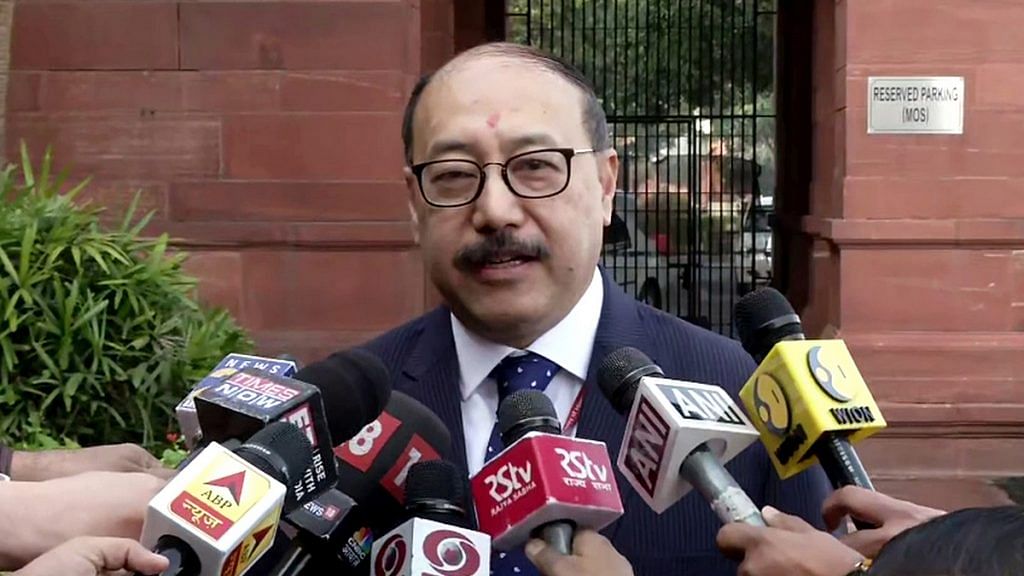New Delhi: India’s Foreign Secretary Harsh Vardhan Shringla has allayed fears that Prime Minister Narendra Modi’s call for ‘Aatmanirbhar Bharat (self-reliant India)’ will mean more isolationism.
Shringla said economic diplomacy will remain a key focus going forward, even as India works towards becoming self-reliant.
“We do not seek self-centred or isolationist arrangements when we speak of self-reliance. A self-reliant India will automatically be a more internationalist India,” Shringla said.
He added that diplomatic and security establishments are “no longer like a coin” in today’s India.
“Foreign and security policies are now facets of a many-sided polygon… It is also good to remember that the business of statecraft has never been in binaries,” the senior-most diplomat said.
Also read: India intensifies engagement with Indo-Pacific partners as Covid-19 rages on
‘We live in a dangerous world’
Shringla was delivering a virtual address to the National Defence College Friday. He said it’s a “dangerous world” we are living in, where the Covid-19 pandemic has brought “new and uncertain dangers” in addition to the existing challenges of terrorism and growing threats to peace and security.
“We live in a world where much is possible. We also live in a very dangerous world. The current pandemic underlines some of these dangers. It is a time of disruptions, of the unexpected and of the uncertain,” the foreign secretary said.
“The pandemic, and its consequences, immediate and future, are an illustration of the level of uncertainty that we must live with. We are faced with new and uncertain dangers even as we struggle with existing threats to international peace and security.”
No ‘good’ or ‘bad’ terrorists
The topic of Shringla’s speech was ‘India’s Foreign Policy Options in the Emerging World Order’, and he said while the world is engaged in fighting the pandemic that has brought a whole new set of challenges and uncertainties, terrorism “remains a growing and resistant cancer”.
Reiterating India’s long-pending demand to have a global initiative to fighting terror, Shringla said everyone has to ensure that “politicisation of global mechanisms such as UN listings is avoided, and the global community finalises a Comprehensive Convention on International Terrorism (CCIT)”.
The adoption of the CCIT was first proposed by India in 1996 under the UN, in order to have one common template in countering terrorism. It has been in limbo ever since, due to opposition from several countries.
Shringla also said radical ideologies continue to encourage the growing tendencies of violence and insecurity.
“There are no good or bad terrorists,” he said, adding that India has been a major victim of cross-border terrorism.
“As a country which has suffered for long from cross-border terrorism, we have been steadfast in seeking action against those who control, support, fund and shelter terrorists,” the foreign secretary added.
Also read: Jaishankar raises terrorism at SCO Covid meet, says it’s still overwhelming threat
No one knows where the next war will be fought
Shringla also stressed that the world is now facing a ‘Black Swan’ moment where nobody knows where the next war could be fought.
“Like the economy, today’s battle space is not limited by geographical or physical boundaries. It is interlinked and multi-dimensional… A physical microbe has taken us all by surprise,” he said.
“What it also tells us is that we have no idea where the next such event will be. It could come from cyber space, a computer virus, could be a disinformation campaign that produces civilian unrest, or could be a major act of terrorism, even financial terrorism. This is only an indicative list.”
However, Shringla said this is also a moment of “opportunity”.
Citing the analogy of the two World Wars and the Great Depression that ultimately gave rise to economic growth and spurred investments in public health, he said “all crises alter geopolitics”.
Also read: India isn’t worried about tension with China, unlikely to give in to US pressure on Taiwan
